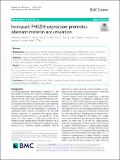Increased PHGDH expression promotes aberrant melanin accumulation
Author(s)
Mattaini, Katherine R.; Sullivan, Mark R.; Lau, Allison N.; Fiske, Brian P.; Vander Heiden, Matthew G.
DownloadPublished version (1.149Mb)
Publisher with Creative Commons License
Publisher with Creative Commons License
Creative Commons Attribution
Terms of use
Metadata
Show full item recordAbstract
Background: Copy number gain of the D-3-phosphoglycerate dehydrogenase (PHGDH) gene, which encodes the first enzyme in serine biosynthesis, is found in some human cancers including a subset of melanomas. Methods: In order to study the effect of increased PHGDH expression in tissues in vivo, we generated mice harboring a PHGDH tetO allele that allows tissue-specific, doxycycline-inducible PHGDH expression, and we analyzed the phenotype of mice with a ubiquitous increase in PHGDH expression. Results: Tissues and cells derived from PHGDH tetO mice exhibit increased serine biosynthesis. Histological examination of skin tissue from PHGDH tetO mice reveals the presence of melanin granules in early anagen hair follicles, despite the fact that melanin synthesis is closely coupled to the hair follicle cycle and does not normally begin until later in the cycle. This phenotype occurs in the absence of any global change in hair follicle cycle timing. The aberrant presence of melanin early in the hair follicle cycle following PHGDH expression is also accompanied by increased melanocyte abundance in early anagen skin. Conclusions: These data suggest increased PHGDH expression impacts normal melanocyte biology, but PHGDH expression alone is not sufficient to cause cancer.
Date issued
2019-07-22Department
Massachusetts Institute of Technology. Department of Biology; Koch Institute for Integrative Cancer Research at MITJournal
BMC cancer
Publisher
Springer Science and Business Media LLC
Citation
Mattaini, Katherine R. et al. "Increased PHGDH expression promotes aberrant melanin accumulation." BMC cancer 19 (2019): :723 © 2019 The Author(s)
Version: Final published version
ISSN
1471-2407
Keywords
Genetics, Cancer Research, Oncology